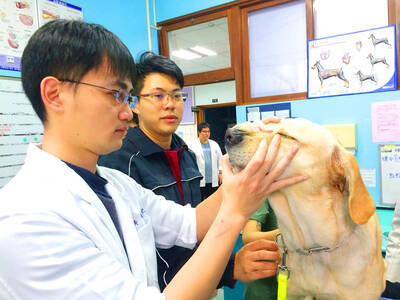Following the installation of 100 small air-quality monitors in Taoyuan’s Kuanyin Industrial Park (觀音工業區), two factories are being prosecuted for violating air pollution and waste disposal regulations, Environmental Protection Administration officials said yesterday.
The action is part of the agency’s four-year, NT$200 million (US$6.6 million) plan to install 10,200 small air-quality monitors nationwide, Department of Environmental Monitoring and Information Management Director-General Chang Shuenn-chin (張順欽) told a news conference in Taipei yesterday.
The first 100 monitors, installed on lighting poles in the park, are quick testers for PM2.5 pollutants, volatile organic compounds, temperature and humidity, Chang said.
They can submit data to the agency’s database every three minutes, he said.
While stationary stations indicate the general air quality of a region, the micro monitors’ instant data can narrow down the suspected contamination area, Bureau of Environmental Inspection Northern Branch Director Chuang Hsun-cheng (莊訓城) said.
Inspectors would examine all sources of pollution in the suspected spot, Chuang said, adding that the monitors were installed at the request of residents.
Hua-chen Precision Co and Tai-yi Dyeing Co officials face prison terms of one to five years and fines of NT$200,000 to NT$15 million if found in violation of the Waste Disposal Act (廢棄物清理法) and the Air Pollution Control Act (空氣污染防制法), he said.
Hua-chen had allegedly illegally disposed other companies’ sludge even though it had been asked to stop operations by the Taoyuan Department of Environmental Protection in 2015 and lacked any waste-disposal permits, he said.
Tai-yi, asked to stop operations by the department last year due to its polluting emissions, also secretly resumed its business, he said, adding that the two cases have been forwarded to Taoyuan District Prosecutors’ Office.
Two other companies, Tung-hsin Industry Co and Super Max Engineering Co, face fines of NT$20,000 to NT$200,000 for violating the Air Pollution Control Act, he said.

Former Czech Republic-based Taiwanese researcher Cheng Yu-chin (鄭宇欽) has been sentenced to seven years in prison on espionage-related charges, China’s Ministry of State Security announced yesterday. China said Cheng was a spy for Taiwan who “masqueraded as a professor” and that he was previously an assistant to former Cabinet secretary-general Cho Jung-tai (卓榮泰). President-elect William Lai (賴清德) on Wednesday last week announced Cho would be his premier when Lai is inaugurated next month. Today is China’s “National Security Education Day.” The Chinese ministry yesterday released a video online showing arrests over the past 10 years of people alleged to be

THE HAWAII FACTOR: While a 1965 opinion said an attack on Hawaii would not trigger Article 5, the text of the treaty suggests the state is covered, the report says NATO could be drawn into a conflict in the Taiwan Strait if Chinese forces attacked the US mainland or Hawaii, a NATO Defense College report published on Monday says. The report, written by James Lee, an assistant research fellow at Academia Sinica’s Institute of European and American Studies, states that under certain conditions a Taiwan contingency could trigger Article 5 of NATO, under which an attack against any member of the alliance is considered an attack against all members, necessitating a response. Article 6 of the North Atlantic Treaty specifies that an armed attack in the territory of any member in Europe,

LIKE FAMILY: People now treat dogs and cats as family members. They receive the same medical treatments and tests as humans do, a veterinary association official said The number of pet dogs and cats in Taiwan has officially outnumbered the number of human newborns last year, data from the Ministry of Agriculture’s pet registration information system showed. As of last year, Taiwan had 94,544 registered pet dogs and 137,652 pet cats, the data showed. By contrast, 135,571 babies were born last year. Demand for medical care for pet animals has also risen. As of Feb. 29, there were 5,773 veterinarians in Taiwan, 3,993 of whom were for pet animals, statistics from the Animal and Plant Health Inspection Agency showed. In 2022, the nation had 3,077 pediatricians. As of last

XINJIANG: Officials are conducting a report into amending an existing law or to enact a special law to prohibit goods using forced labor Taiwan is mulling an amendment prohibiting the importation of goods using forced labor, similar to the Uyghur Forced Labor Prevention Act (UFLPA) passed by the US Congress in 2021 that imposed limits on goods produced using forced labor in China’s Xinjiang region. A government official who wished to remain anonymous said yesterday that as the US customs law explicitly prohibits the importation of goods made using forced labor, in 2021 it passed the specialized UFLPA to limit the importation of cotton and other goods from China’s Xinjiang Uyghur region. Taiwan does not have the legal basis to prohibit the importation of goods